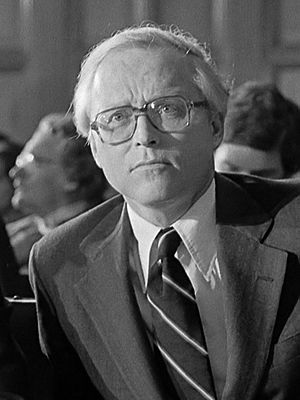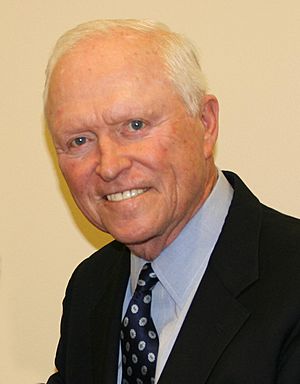Benjamin Civiletti facts for kids
Quick facts for kids
Ben Civiletti
|
|
|---|---|

Civiletti in 1979
|
|
| 73rd United States Attorney General | |
| In office August 16, 1979 – January 19, 1981 |
|
| President | Jimmy Carter |
| Preceded by | Griffin Bell |
| Succeeded by | William French Smith |
| 17th United States Deputy Attorney General | |
| In office May 16, 1978 – August 16, 1979 |
|
| President | Jimmy Carter |
| Preceded by | Peter F. Flaherty |
| Succeeded by | Charles B. Renfrew |
| United States Assistant Attorney General for the Criminal Division | |
| In office March 10, 1977 – May 16, 1978 |
|
| President | Jimmy Carter |
| Preceded by | Dick Thornburgh |
| Succeeded by | Philip Heymann |
| Personal details | |
| Born |
Benjamin Richard Civiletti
July 17, 1935 Peekskill, New York, U.S. |
| Died | October 16, 2022 (aged 87) Lutherville, Maryland, U.S. |
| Political party | Democratic |
| Spouse |
Gaile Lundgren
(m. 1958) |
| Children | 3 |
| Education |
|
Benjamin Richard Civiletti (July 17, 1935 – October 16, 2022) was an American lawyer. He served as the top lawyer for the U.S. government, called the United States Attorney General, from 1979 to 1981. This was during the time Jimmy Carter was President.
Civiletti was the first Italian American to lead the U.S. Department of Justice. Before becoming Attorney General, he was the Deputy Attorney General and an Assistant Attorney General for the Criminal Division. Later, he worked as a senior partner at a law firm called Venable LLP. He focused on legal issues for businesses and looking into problems within companies.
Starting in 2001, Civiletti was part of a special group called the Independent Review Board. This board helped make sure the International Brotherhood of Teamsters union stayed honest. They looked into claims of corruption or organized crime within the union. This board was set up by a court decision in 1989.
Contents
Early Life and Education
Benjamin Civiletti was born in Peekskill, New York. His father, Benjamin, managed a grocery store. His mother was Virginia Muller. He grew up in nearby Lake Mahopac and Shrub Oak.
Civiletti went to Washington Irving High School in Tarrytown. He then studied at Johns Hopkins University, earning a degree in psychology in 1957. He also attended Columbia Law School. He earned his law degree from the University of Maryland School of Law in Baltimore.
After law school, Civiletti worked for a judge named W. Calvin Chesnut. Then, he became an assistant United States Attorney in Baltimore. He held this job until 1964.
Career in Government
Civiletti's skills were noticed by Griffin Bell, who was helping President Jimmy Carter choose his legal team. In 1977, President Carter nominated Civiletti to lead the Criminal Division. This part of the Justice Department handles federal crimes.
In 1978, he was chosen to become the Deputy Attorney General. This is the second-highest position in the Justice Department.
Becoming Attorney General
When Griffin Bell stepped down as Attorney General, Civiletti was serving as his deputy. On July 19, 1979, Civiletti was appointed to the top job. He became the first Italian American to hold the position of Attorney General.
His appointment happened during a time when President Carter was making many changes to his team. Other important leaders, like the Secretary of Health and Human Services, also resigned around the same time.
Important Cases and Decisions
As the U.S. Attorney General, Civiletti argued several important cases for the government. He spoke before the International Court of Justice about Americans being held in Iran during the Iran hostage crisis. This court settles disagreements between countries.
He also argued before the Supreme Court. He supported the government's right to take away citizenship from former Nazis who had committed war crimes. This was in a case called Fedorenko v. United States.
Civiletti also wrote important legal opinions. These opinions explained that the government cannot operate without Congress agreeing on a spending plan. These ideas later helped set the rules for when parts of the government might temporarily shut down.
While Attorney General, Civiletti suggested that President Carter reduce the sentences of four Puerto Rican nationalists. These individuals had been convicted of shooting five U.S. Congressmen. President Carter agreed to this, even though some people in Puerto Rico disagreed.
Later Public Service
In 2008, the Governor of Maryland, Martin O'Malley, asked Civiletti to lead a special commission. This group was set up to study the use of the death penalty in Maryland. They were asked to recommend if the state should stop using it.
On November 12, 2008, the commission voted to recommend that Maryland stop using the death penalty. Civiletti voted with the majority.
Personal Life
Benjamin Civiletti married Gaile L. Lundgren in 1958. They had three children: Benjamin H., Andrew S., and Lynne T. Civiletti.
Civiletti passed away on October 16, 2022, at his home in Lutherville, Maryland. He was 87 years old and had been living with Parkinson's disease.
Recognition
Civiletti received several awards for his work:
- 1980: Golden Plate Award from the American Academy of Achievement
- 2009: American Lawyer's Lifetime Achievement Award
- 2012: Lifetime Achievement Award by the Equal Justice Council
Images for kids
 | Delilah Pierce |
 | Gordon Parks |
 | Augusta Savage |
 | Charles Ethan Porter |




